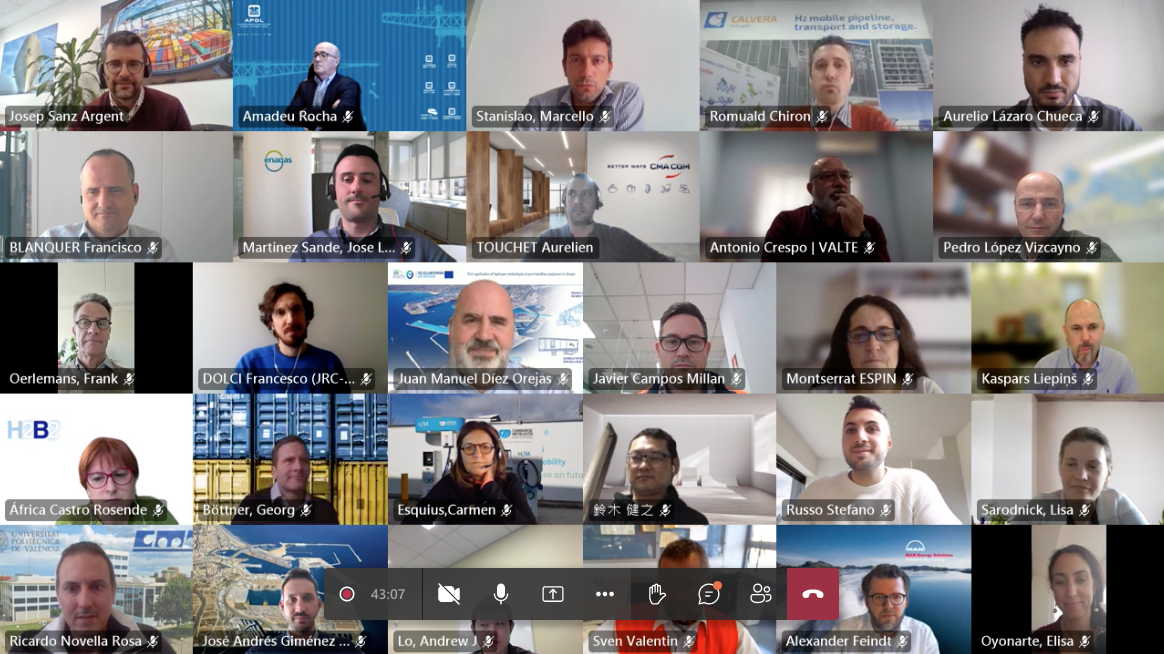Valencia – 09.03.22. This afternoon, the 3rd meeting of the H2PORTS hydrogen project stakeholders group was held in virtual format with a great success, reaching more than 80 attendees.
The objective of this group is to promote the exchange of knowledge, experiences and good practices on the use of hydrogen in the maritime-port sector. One of its main activities is the organisation of thematic meetings in which the state of the technology is presented and inspiring results of real projects developed in the sector are shared.
On this occasion, the H2 logistics was chosen as the central topic of the meeting, and four relevant speakers were selected. Firstly, Francesco Dolci, scientific officer from Joint Research Centre, explained the techno-economic and life cycle assessment of the different hydrogen delivery options, including the combination of several transport modes for hydrogen. Next Romuald Chiron, from Calvera, spoke about the transport systems for gaseous H2 and the potential needs from the sector in terms of packaging and road transport, and José Luis Martínez Sande, from Enagás Renovable, gave a presentation on H2 pipeline solutions detailing how to bring clean energy to more sectors and a brief overview of the related regulation. Finally, Natalie Gupta, from Yara Clean Ammonia, addressed the use of ammonia as a hydrogen carrier as a potential solution to decarbonise shipping.
It is also worth mentioning the participation in this meeting of the Head of Strategic Planning and Innovation of the Port Authority of Valencia, Juan Manuel Díez, who expressed his satisfaction at the interest aroused by this meeting and stressed the Port of Valencia’s commitment to the use of hydrogen as a clean energy.
The H2PORTS stakeholder group, created in January 2020, now has more than 70 member organisations from Europe, Canada, Japan and the United States.
H2PORTS
The European project “H2Ports – Implementing Fuel Cells and Hydrogen Technologies in Ports” is an initiative coordinated by Fundación Valenciaport in close collaboration with the Port Authority of Valencia and financed by the Clean Hydrogen JU, the successor of Fuel Cells and Hydrogen Joint Undertaking (FCH JU) programme. Its main objective is to test and validate hydrogen technologies on port machinery that allow to have applicable and real solutions without affecting the performance and safety of port operations and producing zero local emissions.
The H2Ports project will entail a total investment of 4 million euros and involves, in addition to Fundación Valenciaport and the Port Authority of Valencia, the Centro Nacional del Hidrógeno, and the private companies MSC Terminal Valencia, Grimaldi Group, Hyster-Yale, Atena Distretto Alta Tecnologia Energia Ambiente, Ballard Power Systems Europe and Enagás.
Thanks to this initiative, the Port of Valencia will be the first port in Europe to incorporate hydrogen technologies to reduce the environmental impact of its operations.
About the Clean Hydrogen Partnership
The Clean Hydrogen Partnership – the successor of the Fuel Cells and Hydrogen Joint Undertaking (FCH JU) – aims to strengthen and integrate European Union research and innovation capacity to accelerate the development and improvement of advanced clean hydrogen applications ready for market, across energy, transport, building and industrial end-uses, while strengthening competitiveness of the Union clean hydrogen value chain. The three members of the partnership are the European Commission, fuel cell and hydrogen industries represented by Hydrogen Europe and the research community represented by Hydrogen Europe Research.







